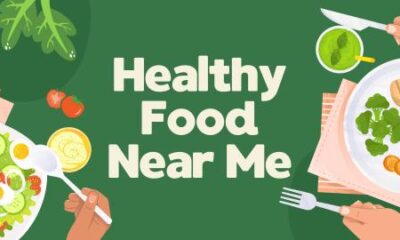Uncategorized
The Importance of Healthy Food in Your Diet
The Importance of Healthy Food in Your Diet


In today’s fast-paced world, where convenience often trumps nutrition, it’s crucial to recognize the significance of healthy food in maintaining overall well-being. Adopting a diet rich in nutritious foods not only fuels our bodies but also supports our physical and mental health in numerous ways.
Why Healthy Eating Matters
Healthy eating habits play a fundamental role in promoting optimal health and preventing various chronic diseases. By nourishing our bodies with the right nutrients, we enhance our immune system, boost energy levels, and improve our mood and cognitive function.
Components of a Healthy Diet
A balanced diet comprises essential nutrients, including macronutrients like carbohydrates, proteins, and fats, as well as micronutrients such as vitamins and minerals. Incorporating a variety of nutrient-dense foods ensures that our bodies receive the necessary fuel to function efficiently.
Examples of Healthy Foods
- Fruits and Vegetables: Rich in vitamins, minerals, and antioxidants, fruits and vegetables are essential for supporting overall health and reducing the risk of chronic diseases.
- Whole Grains: Whole grains provide fiber and essential nutrients, promoting digestive health and reducing the risk of heart disease and diabetes.
- Lean Proteins: Sources of lean protein, such as poultry, fish, tofu, and legumes, are vital for muscle repair and growth, as well as maintaining a healthy weight.
- Healthy Fats: Incorporating sources of healthy fats, such as avocados, nuts, seeds, and olive oil, supports heart health and brain function.
The Role of Water
Hydration is key to maintaining optimal health. Water plays a crucial role in regulating body temperature, supporting digestion, and transporting nutrients throughout the body. Staying adequately hydrated is essential for overall well-being.
Tips for Incorporating Healthy Foods
Adopting healthy eating habits can be simple with the right strategies:
- Meal Planning: Plan your meals ahead of time to ensure balanced nutrition and avoid unhealthy food choices.
- Portion Control: Be mindful of portion sizes to prevent overeating and maintain a healthy weight.
- Healthy Cooking Methods: Opt for cooking methods like grilling, baking, or steaming to preserve nutrients without excess added fats.
Common Myths About Healthy Eating
Despite the abundance of information available, there are common misconceptions surrounding healthy eating. It’s essential to debunk myths and focus on evidence-based nutrition principles to make informed dietary choices.
The Connection Between Diet and Health
Our dietary choices have a profound impact on our overall health and well-being. By prioritizing nutritious foods and adopting healthy eating habits, we empower ourselves to lead vibrant, fulfilling lives.
Conclusion
Incorporating healthy food into your diet is essential for maintaining optimal health and well-being. By prioritizing nutrient-rich foods and adopting healthy eating habits, you can nourish your body, support your immune system, and reduce the risk of chronic diseases.
FAQs
- Is it necessary to eliminate all unhealthy foods from my diet? While it’s important to prioritize healthy foods, occasional indulgences in moderation can be part of a balanced diet.
- Are organic foods always healthier than conventionally grown options? Organic foods may have fewer pesticide residues, but both organic and conventional options can be part of a healthy diet.
- Do I need to take dietary supplements if I eat a healthy diet? In most cases, a well-rounded diet provides all the nutrients your body needs. However, certain individuals may benefit from specific supplements under the guidance of a healthcare professional.
- Can healthy eating improve mental health? Yes, consuming nutrient-dense foods can positively impact mental health by supporting brain function and mood regulation.
- How can I make healthy eating more affordable? Look for seasonal produce, buy in bulk when possible, and prioritize plant-based proteins and whole grains, which are often more budget-friendly options.
-

 Uncategorized2 months ago
Uncategorized2 months ago15 Deceptive Myths About Nutritious Eating We’ve Embraced for Generations
-

 Uncategorized1 month ago
Uncategorized1 month agoNavigating the Pursuit of Wellness: Unveiling the Domain of Healthy Food Near Me
-

 Snacks and Appetizers5 months ago
Snacks and Appetizers5 months agoCrunchy crisps from the oven: the perfect snack without the shame
-

 Lunch and Dinner Recipes5 months ago
Lunch and Dinner Recipes5 months agoSeafood sensation: delicious and nutritious fish recipes for a healthy dinner
-

 Breakfast Recipes6 months ago
Breakfast Recipes6 months agoHomemade power bar: the excellent grab-and-go breakfast option for an active early morning
-

 Lunch and Dinner Recipes5 months ago
Lunch and Dinner Recipes5 months agoVegetarian Stir-Fry: A Burst Of Health And Flavor In Every Bite
-

 Snacks and Appetizers6 months ago
Snacks and Appetizers6 months agoDeliciously hot Guacamole and salsa recipes to enhance the great experience
-

 Breakfast Recipes6 months ago
Breakfast Recipes6 months agoProtein-Packed Pancakes: A Delicious Method To Start Your Day














